Recent Comments
Prev 54 55 56 57 58 59 60 61 62 63 64 65 66 67 68 69 Next
Comments 3051 to 3100:
-
David-acct at 08:37 AM on 1 June 2023Skeptical Science New Research for Week #21 2023
The NERC 2023 reliability assessment/risk assessment goes into much further detail regarding the risks.
the Key point is detailed on page 44 of the report which shows the expected share of nameplate capacity for wind will be approx 19% (with only ERCOT exceeding 20% at 33%). What the reliability/risk assessment report is showing is the limitation of wind during peak loads.
EIA . gov is an excellent source of real time data which details the supply of electricity generated by source. Its very worthwhile to study and understand the detail provided, and thus become educated on the topic based on real time data.
Please note that you can select any US grid and any time period to get actual real time data
As comparison - you can select the months of July or August of 2022. The MISO, SWP and Ercot grids experienced significant declines in wind production of 7-9-22 through 7-14-2022, then again later in the month, Then again 8-9-2022 through 8-14-2022 and again starting 8-22-22, each of which were for periods 5 to 6 plus days.
-
Eclectic at 07:29 AM on 1 June 2023At a glance - How reliable are climate models?
Doug Bostrom @17 ~ A good point. Very !
PSBaker @15 ~ it would be helpful if you gave more detail on the 3 papers you mention.
Your first paper (H.Nissan et al., 2019) appears very vague, and talks in a general way about farmers' need for medium term weather predictions wrt pesticide spraying scheduling and suchlike agricultural management. Also talks (slightly) about 30-50 year plannings for dam construction. Overall, the paper had such an unapt & vague manner, that I began to suspect the authors were using AI-generated [ChatGPT] . This was not helped by their mention of soil-moisture predictions in three disparate parts of Bangladesh, nor of vague reference to rainfall pattern prediction in Kenya/Somalia. PSBaker, your quoted extract from the paper provides little-to-nil relevance to global climate modeling . . . and yet you seem to be using the #15 quote to circle back to a disparagement of climate models. [ If this was not your intent, then please be very specific on the point you were wishing to make. ]
Your second paper ( J.J.Lambrechts 2023) was paywalled [for me] but a half-Extract talked of micro-climates in a manner that suggested the body of the paper was not relevant to global climate modeling. Remember, this thread is a computer climate model thread.
Your third paper (Maclean & Early, 2023) was similarly unapt . . . but the paper's body did provide some amusement :- "We model ... distributions of 244 heathland and grassland plant taxa using both macro- and microclimate data and project these distributions ... [regarding] improving protection of refugial populations within species' geographic range ..."
Refugial populations of humans ~ would be more relevant to this thread.
-
Doug Bostrom at 05:03 AM on 1 June 2023At a glance - How reliable are climate models?
Tip of the hat to Gordon for reminding us of why Skeptical Science must unfortunately exist.
-
Rob Honeycutt at 00:54 AM on 1 June 2023At a glance - How reliable are climate models?
Gordon @12... For the tropical mid-troposphere that's not an accurate statement, though, since those "observed temperatures" are known to be very hard to collect and have a very high level of uncertainty. It's as likely the obs are running cool. That's an area of the atmosphere (specifically selected by John Christy) where the modeling is probably giving us better information than oberserations.
-
PSBaker at 18:38 PM on 31 May 2023At a glance - How reliable are climate models?
@ Bob Loblaw 8: I was not referring to contrarian sources, nor the global models of which you give an example.
Read Nissan’s et al paper to see what I mean DOI: 10.1002/wcc.579 “Climate models are unable to represent future conditions at the degree of spatial, temporal, and probabilistic precision with which projections are often provided, which gives a false impression of confidence to users of climate change information.”
Or more recent critiqueshttps://www.nature.com/articles/s41558-023-01632-5
https://www.nature.com/articles/s41558-023-01650-3
Moderator Response:[BL] Full link to the first reference mentioned is this
Second and third links turned into actual links..
The web software here does not automatically create links. You can do this when posting a comment by selecting the "insert" tab, selecting the text you want to use for the link, and clicking on the icon that looks like a chain link. Add the URL in the dialog box.
-
Eclectic at 18:19 PM on 31 May 2023At a glance - How reliable are climate models?
Gordon ~ Dr Christy's chart of 300-200 hPa . . . .
represents the atmosphere above the summit of Mt Everest.
Even a Yeti would die at those altitudes.
Possibly Dr Christy did not inform the Congressmen of the uselessness of his chart. But he still drew up the chart for them.
-
nigelj at 17:19 PM on 31 May 2023At a glance - How reliable are climate models?
Gordon @10
The IPCC WR5 projection in your comments includes observational data from 1970 - 2012 only. Its old data possibly from an older IPCC report. The observational data is quite close to the modelling for much of that period but the years 2005 - 2012 (approx) in that graph clearly fall significantly below the modelling mid line prediction. But this is a relatively short time frame, and it represents short term natural variation that models can't fully predict in terms of timing. This is the alleged pause in surface temperatures, which amounted to a flat period in the warming trend of about 7 years and was due to the influence of natural variation ( in simple terms)
The graph posted by Bob Loblow @ 8 includes observational data from 1970 - 2022 and so its much wider and more recent data, and its obvious that the warming trend from 2012 - 2022 has swung back to near the model mid line prediction, and that the observational trend is tracking quite close to the modelling overall for the full period 1920 - 2022. The modelling is obviously not running significantly hot.
I'm surprsied you didn't notice any of this.
-
Gordon21829 at 15:19 PM on 31 May 2023At a glance - How reliable are climate models?
Ron @11 similar insofar as the models are running hotter than the observed temperatures.
-
Rob Honeycutt at 15:05 PM on 31 May 2023At a glance - How reliable are climate models?
Gordon @10... It's not a similar chart, not least of all because it's an actual global mean projection rather than mid-troposphere.
-
Gordon21829 at 14:45 PM on 31 May 2023At a glance - How reliable are climate models?
Bob @ 6
Why does the IPCC run a similar chart in AR5 ?
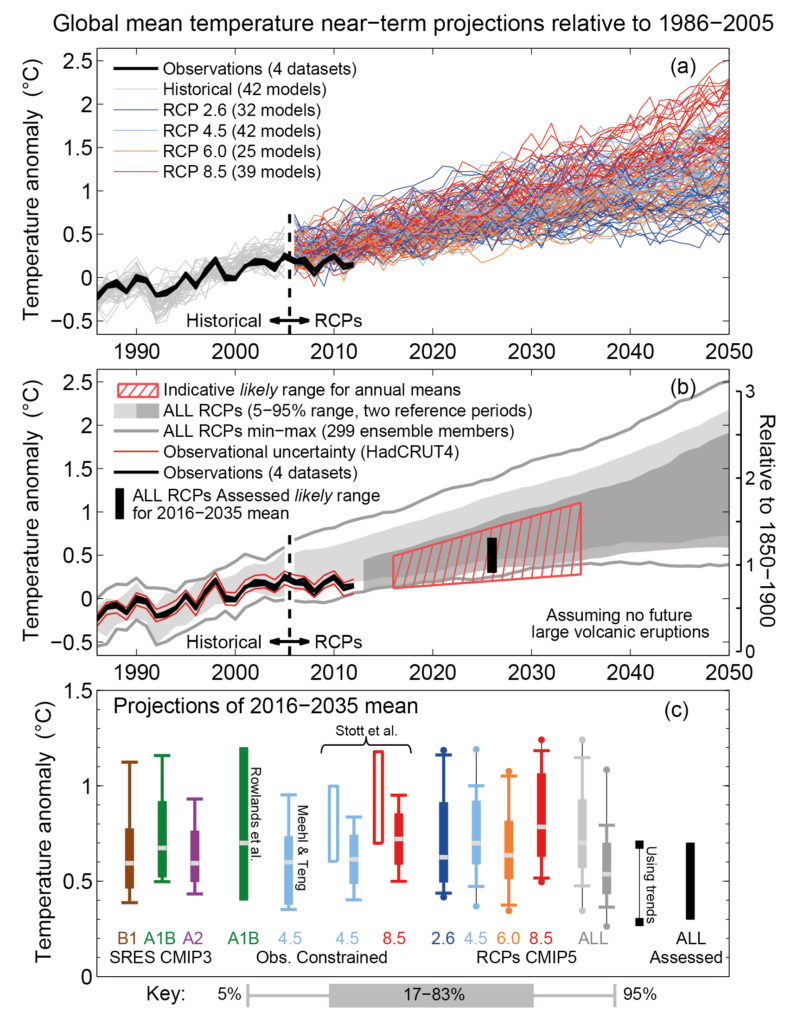
-
Rob Honeycutt at 14:19 PM on 31 May 2023At a glance - How reliable are climate models?
A question for Gordon: Do you understand what "300-200hPa tropical temperature anomalies" are?
-
Bob Loblaw at 11:48 AM on 31 May 2023At a glance - How reliable are climate models?
PSBaker @1:
You need to stop reading contrarian sources that ignore the uncertainties that the scientists are presenting and try to pretend that it is the scientists that are ignoring the uncertainties.
Here is a recent RealClimate post that compares models and observations. They update it each year.
Here is the main figure from that post. Notice how it has a shaded area showing the "Model ensemble spread"? Is that too "hidden"?
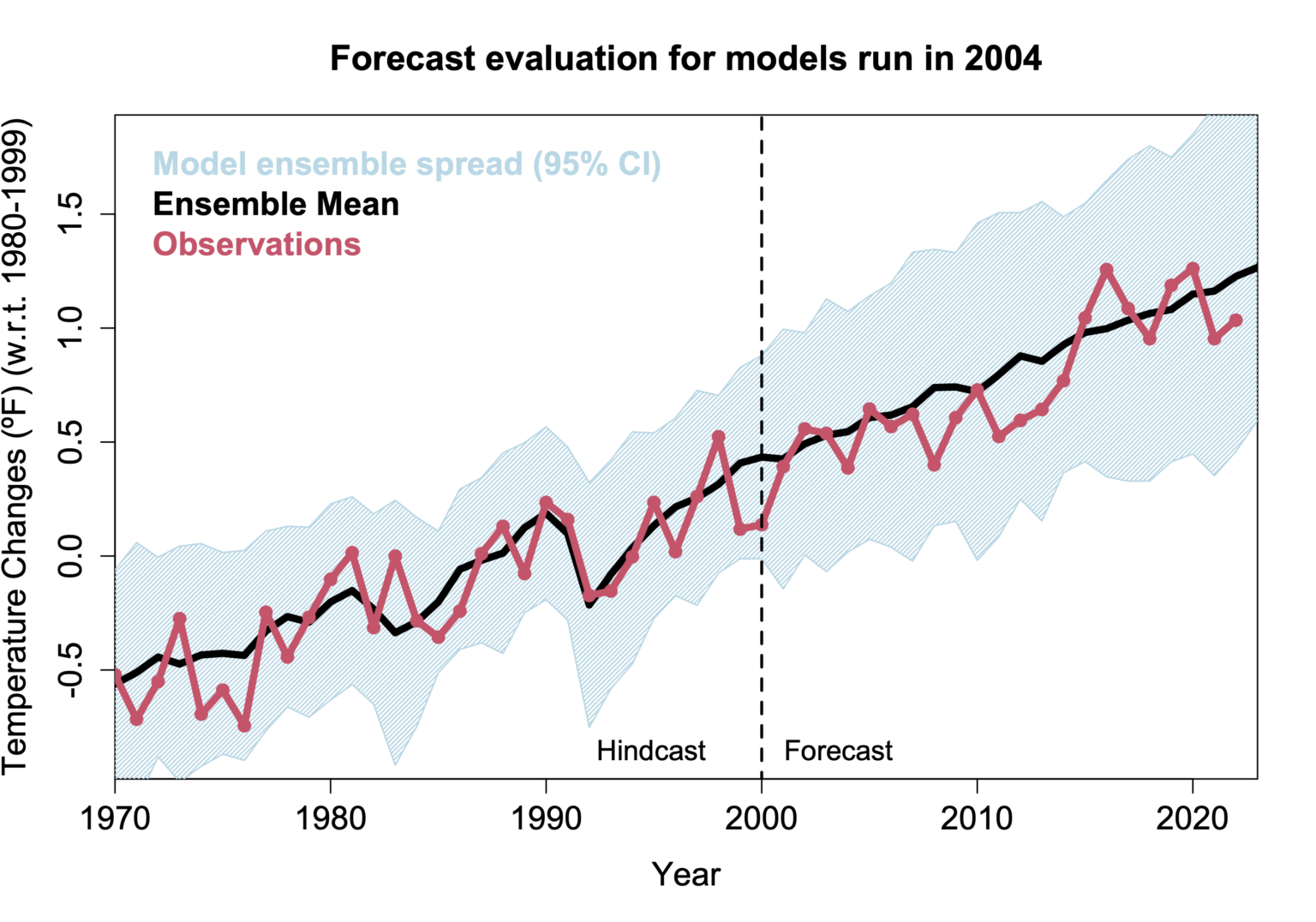
You may also wish to read the links and look at the graphs I have presented above, in response to Gordon.
-
Bob Loblaw at 11:40 AM on 31 May 2023At a glance - How reliable are climate models?
Oh, and if you want to read about how unreliable Christy's satellite temperature data has been over the years, read about it here and take a look at this graphic showing how often Christy has had to fix errors:
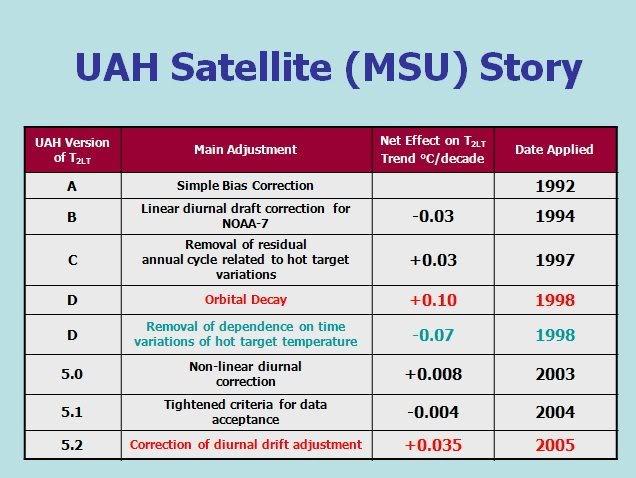
-
Bob Loblaw at 11:27 AM on 31 May 2023At a glance - How reliable are climate models?
Gordon @ 5:
Congratulations on exposing the sources you are using for your comments here. It is unfortunate that so much of the "contrarian" talking points keep going back to the same unreliable sources.
This looks like another variation of a diagram from John Christy's flawed work, which has been debunked many times before. It is even featured in the Models are unreliable page that this short "at a glance" is updating. It is unfortunate that people like you can't be bothered to read the full blog posts you are challenging.
Here is the figure from that SkS page:
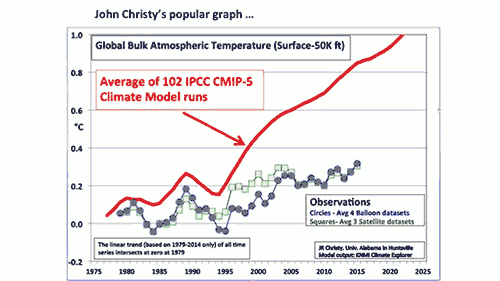
Here are a couple of RealClimate posts on the matter:
...and the key figure from those posts.
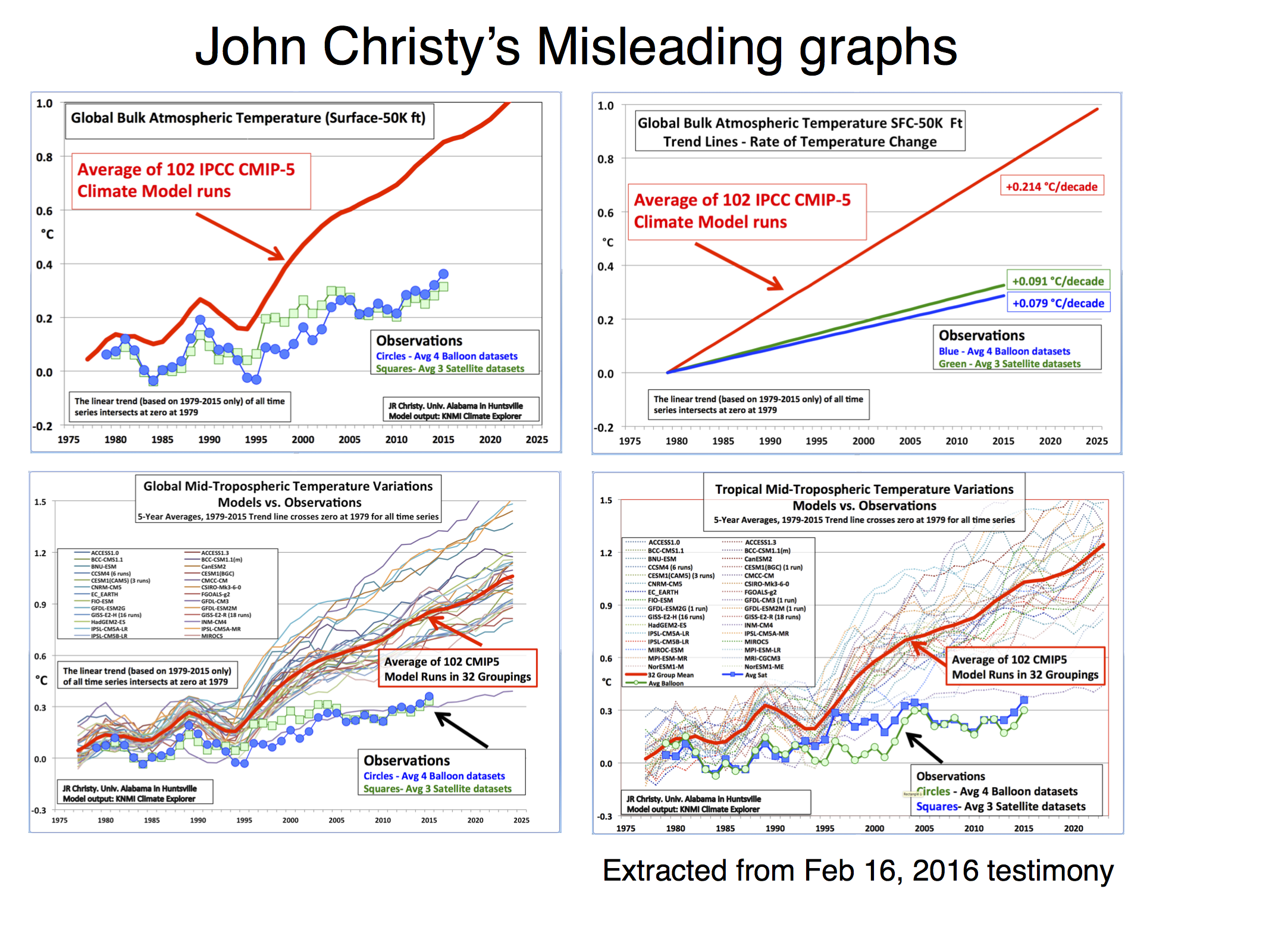
-
Gordon21829 at 10:48 AM on 31 May 2023At a glance - How reliable are climate models?
How reliable are computer models ?
According to the chart below - not very !
Its unfortunate that so much of the scientific literature relies on these models in making projections.
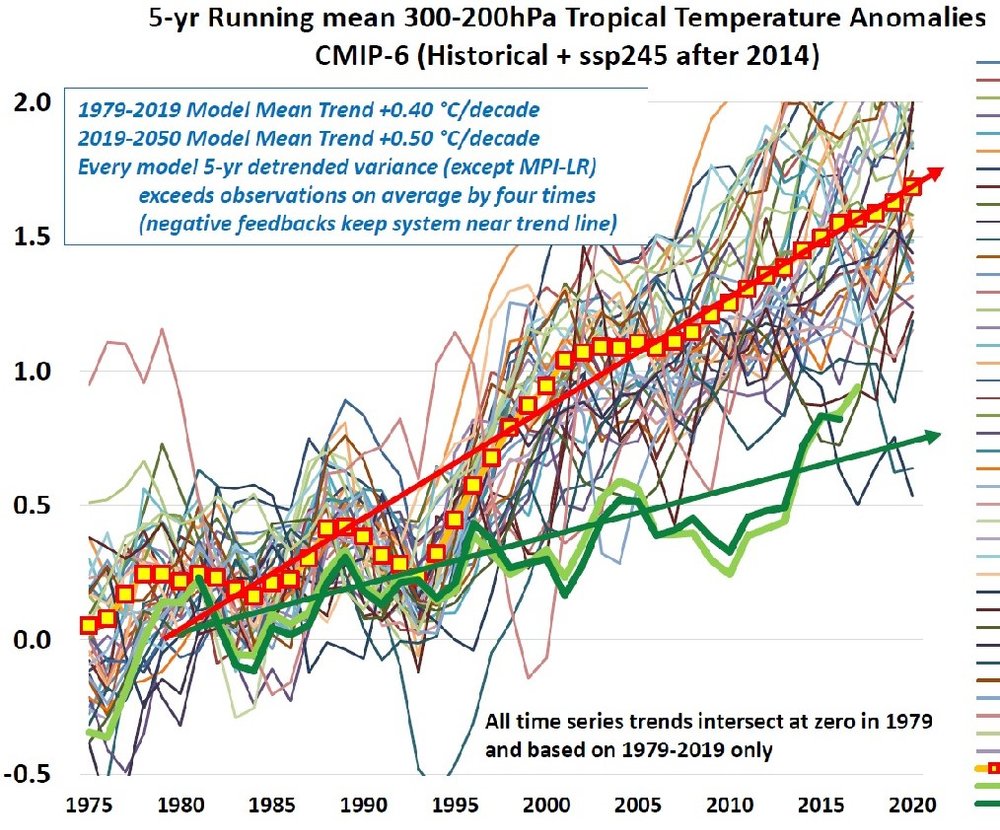
-
One Planet Only Forever at 03:35 AM on 31 May 202310 year anniversary of 97% consensus study
The discussion here regarding the potential position of climate scientists regarding climate change impacts being catastrophic is interesting.
Based on Gordon’s comments it is obvious that the question to be asked of climate scientists is “Does your understanding support the claim that 4 C of warming would be potentially catastrophic?” His alternative question, evading the term potentially’ misleads the discussion into a ‘simplistic but complicated’ debate about the meaning of ‘catastrophic climate change impacts’.
‘How significant’ a catastrophe needs to be to ‘count’ is not a matter of personal opinion. It also is not a matter of political popularity or business popularity and profitability. Applying ethical considerations to the available evidence can establish a general common sense understanding that relates to this matter. Morality and Ethics basically say that preventable harm done is unacceptable, especially if the damage done is irreparable. The construction industry pursuit of ‘zero-injury’ in more advanced nations is a ‘business’ example of the application of this concept. However, political popularity or business popularity and profitability can compromise that fundamental ethics with questionable ethical ‘evaluations that consider the benefits obtained by some people to be worth the harm done, especially of the harm is done to ‘identifiable others’.
Many people unethically consider a catastrophe to only count if it happens to the sub-set of humanity that they have decided to identify with. They are not open to accepting the broad diversity of less harmful and more helpful ways of being human in pursuit of developing sustainable improvements for the future of humanity. Those people can be expected to make up a diversity of arguments attempting to distract from learning about harm done to others. They will even try to diminish harm done to others in the future (a classic ethical test of the merits of things happening later being less important is the question of the ethics of burying a long lasting land mine in a region where it is likely that the mine will only be detonated and harm someone in the distant future).
Using structural engineering or business management as examples of consideration of catastrophe is also helpful. I am a professional civil/structural engineer with an MBA. So these are areas of understanding I am quite familiar with and able to understand in depth.
When engineering things like a structure or surface run-off drainage system there is an important difference between ‘temporary failure of part of the system causing limited and repairable damage’ and a ‘more significant catastrophe affecting more of the system or producing harmful results that are not repairable’. The general engineering rule regarding repairable failure of parts of the system is that the probability of such a localized limited ‘potential catastrophe (because some irreparable harm could occur as a result of the repairable failure) needs to be less than 2%. The potential for a larger or irreparable failure needs to be significantly less than 2%.
For a business, the quarterly or annual lack of performance by a portion of a larger operation is a concern. And a business venture’s sustainability requires the chance of each of those ‘limited catastrophes’ to be small because too many of them happening too often would be a bigger problem. And a larger aspect of the business failing to perform as hoped would need to have a significantly lower probability of occurring.
Sustaining a structure, drainage system, or business requires actions that understandably, based on the evidence, reduce the risk of catastrophic results. Benefiting from harm suffered by others, including avoiding the costs of being less harmful, may be temporarily regionally popular and profitable. But developing sustainable improvements for global humanity requires limitations on the sovereignty (freedom) of ‘all’ portions of the population (business and political) to believe and act as they please.
Relating that understanding to climate change, the probability of ‘catastrophic (irreparable) regional results’, such as needing to relocate or ‘adapt’ any small percentage of already developed human activity, would have to be less than 2%. And the probability of ‘needing to relocate, or revise to adapt, a larger amount of developed human activity’ would need to be a much lower than 2%.
Based on that understanding, open to improvement, the evidence indicates that catastrophic climate change impacts have already occurred at levels of impact below 1.5 C. So, applying that ethical perspective, it is highly likely that a vast majority of climate scientists, perhaps more than 97%, would say that their understanding supports the claim that 4 C of warming would be potentially catastrophic.
Note: There is a very important difference between understanding and opinion. Common sense requires common evidence based ethical understanding. Opinion is free from the restrictions of evidence or ethical consideration.
-
BaerbelW at 02:13 AM on 31 May 2023At a glance - How reliable are climate models?
Regarding the general topic of uncertainties: this handbook might come in handy when talking about them.
-
John Mason at 22:59 PM on 30 May 2023At a glance - How reliable are climate models?
PSBaker #1 - yes rainfall can be difficult, especially when convection is involved! Dynamic rainfall along fronts models far better in my experience - less ingredients needed.
Looking for ways to explain uncertainty is certainly important because lay-folk tend to see things in black and white, whereas uncertainties drive science forward. This is a point that needs making repeatedly as it crops up.
-
Eclectic at 22:26 PM on 30 May 2023At a glance - How reliable are climate models?
PSBaker @1 ~ you are quite right to say that the uncertainties re rainfall are making for a less relatable message to non-specialists [such as me ! ].
Rising sea level, rises in severity & duration of heat waves/ droughts/ floods are all important in the medium term. But a broad-brush picture of what the future holds, is quite sufficient for "us" to base our policy decisions on.
Mathematical delineation of uncertainties is relevant to the scientific specialist ( and especially to the hydrologist re rainfall variation) . . . but uncertainties are, for the rest of us, probably not worth addressing, unless you feel something misleading or nefarious is being concealed by their omission.
-
PSBaker at 19:42 PM on 30 May 2023At a glance - How reliable are climate models?
Agree that temperature models are v useful especially at the global level, in fact they have been amazingly accurate. Less useful are rainfall models; I’ve seen examples of backcasting which are hopeless.
And as models are downscaled, uncertainties increase; when they’re used to predict future species distributions for instance, there are many uncertainties. It’s fine if everyone understands this but the problem is that such uncertainties tend to be downplayed, especially when a popular account appears.
This is exacerbated by the beautifully created, highly coloured and smoothed maps that can appear without any indication of errors/uncertainties, and these can rapidly become a credible reality – but the map is never the territory.
Some modellers get very prickly if you point this out but I think senior scientists and journal editors should be more diligent in ensuring such uncertainties are clearly stated, though of course this makes for a less relatable message to non-specialists. -
Bob Loblaw at 05:08 AM on 30 May 202310 year anniversary of 97% consensus study
I suspect that "catastrophic" is in the eye of the beholder.
Here in Canada, the western part of the country has been experiencing a lot of forest fires this spring. It is not affecting me in central Canada - but I'm sure the people that have lost homes (or lives) in western Canada consider it to be "catastrophic".
And it is not enough to say "this change is catastrophic", as it depends on the time involved. The boreal forest evolved in response to fire, and it wll eventually all burn mutiple times over. But burning 1% of it each year, so it averages out to be 100 years old, is not the same as burning 10% of it each year so none of it reaches maturity.
Likewise for goal posts such as 2C rise in global temperature. Adapting to this rise and all its consequences over a period of 1000 years is entirely feasible. Adapting to it in 100 years? Not so easy.
I do tend to disagree with Michael's last statement, that definitions of "catastrophic" come from people wanting to minimize actions. People that want to minimize actions tend to use "catastrophic" as a highly mutable goal post, and will not provide a definition. If they provided a definition, they would have to defend it (or run away from any discussion that showed how unreasonable their definition is).
-
Bob Loblaw at 04:54 AM on 30 May 2023Don’t get fooled: Electric vehicles really are better for the climate
Yes, definitelynotizume. Additional details would be helpful.
- What sort of temperature range are we talking about. I live where it sometimes gets to -25C in winter, and 30C is common in summer - but I used to live in a place where -40 to +40 was the seasonal range. "Cold" and "hot" can be very subjective!
- What is your typical usage? Daily commutes? City? Highway? How far? How much travel in, say, a week? (i.e., how far is "far"?)
- Are you restricted to charging at home? What level of charger do you have? Do you find it difficult to find fast charging stations for longer trips in your region?
- Is this mostly an obstacle for longer trips, or do you run into problems with shorter trips?
- ...and do you mind mentioning what model of car you have, and how old it is?
All of this would be of interest to anyone considering buying an EV.
-
Rob Honeycutt at 03:58 AM on 30 May 2023Don’t get fooled: Electric vehicles really are better for the climate
definitelynotizume @47... Can you share what EV you have and more specific numbers related to your challenges?
-
definitelynotizume at 03:21 AM on 30 May 2023Don’t get fooled: Electric vehicles really are better for the climate
For me i have some relaiability issues for instance my EV battery does not do well in cold or hot temperatures and i cannot go far with it as it takes a long time to get chargred.
-
BaerbelW at 21:56 PM on 29 May 2023Animals and plants can adapt
Please note: the basic version of this rebuttal was added on May 29 and includes an "at a glance“ section at the top. To learn more about these updates and how you can help with evaluating their effectiveness, please check out the accompanying blog post @ https://sks.to/at-a-glance
We also moved the existing intermediate version to a new advanced version and then updated the intermediate version, so that now all three rebuttal versions exist for this myth.
Thanks - the Skeptical Science Team.
-
michael sweet at 05:02 AM on 27 May 2023What role for small modular nuclear reactors in combating climate change?
The Union of Concerned Scientists just published an article on problems with Moltex Energy's reactor. They find that there are severe problems reprocessing the fuel, large amounts of waste generated and proliferation problems. They want to use 2.5 tons of plutonium, purified from CANDU reactor waste, to startup the reactor.
Nuclear is too expensive and the materials do not exist.
-
BaerbelW at 04:09 AM on 26 May 2023Models are unreliable
Please note: the basic version of this rebuttal has been updated on May 26, 2023 and now includes an "at a glance“ section at the top. To learn more about these updates and how you can help with evaluating their effectiveness, please check out the accompanying blog post @ https://sks.to/at-a-glance
Thanks - the Skeptical Science Team.
-
michael sweet at 02:54 AM on 26 May 202310 year anniversary of 97% consensus study
John Kerry was quoted addressing the British Parliment as saying:
"“If you have five tipping points, and two of them involve the potential of metres, literally multiple metres, double digits of sea level rise, that’s as good a definition of catastrophe as you can achieve.
“And the reality is that that is where we are headed unless we do more about it. Now, why do I have this measure of optimism and of our capacity? Because it is within our capacity."
I thnk in addition to multiple meters of sea level rise there are other potential consequences of climate chnge that would qualify as "catastrophic". Perhaps we could make a list.
I saw a projection of a billion climate refugees or more under some conditions. For me that is way past catastrophic.
How many human deaths in one year , or cumulative, before it counts as catastrophic? Only one if it is a close friend or relative.
What conditions do others here think would count as catastrophic. Perhaps we could find a consensus, Undoubtedly we all have different conditions that have to be met for the problem to be catastrophic.
I remember when the IPCC AR5 came out in 2014 with a list of severe consequences. I wondered at the time if I would live to see sea level rise causing damage, widespread fire storms, heat conditions killing millions etc. I was 56 at the time and thought I would live another 30 years. Now, only 8 years later, we see these problems already happening around the world. I can only imagine what it would be like in 2100 if we do not take as strong action as possible immediately.
In my experience, persons who ask for definations of catastrophic want to minimize the actions we take to try to avoid the already begun catastrophic climate change.
-
scaddenp at 07:41 AM on 25 May 2023Antarctica is gaining ice
Just for clarification for other readers, as I pointed out above, Bart's conjecture "reduced sea ice mean more snowfall" is not expected given very low sea surface temperatures. To demonstrate that, Bart would need to show that precipatation varies in sync with sea-ice (which has both increased and decreased in recent history). By contrast, there is evidence for variations being due to multiyear weather cycles.
As to ice loss (overwhelmingly calving since most of Antarctica is too cold for melt), while the SAM is positive then continued basal erosion of the ice shelves is expected from warm deep water (eg see "The circum-Antarctic ice-shelves respond to a more positive Southern Annular Mode with regionally varied melting" ) and a useful summary here.Loss of ice shelves leads to increased calving (see here with its links to relevent papers) as does loss of sea ice. That is why my money is on continued ice loss despite some weather noise. Let's see what an El Nino will bring after three La Nina years.
-
Bart Vreeken at 19:51 PM on 24 May 2023Antarctica is gaining ice
Thank you very much, scaddenp #579
So text was just removed, which is very annoying! I wasn't sure if I had done anything wrong myself.
But indeed, a rising air temperature and reduced sea ice mean more snowfall and a higher Surface Mass Balance according to multiple models. The question is how that relates to the increased melting and calving along the edges. Nobody knows exactly, and therefore it's good to have a close look on what happens.
BL #577 "He's made a big thing about NASA's 149 Gt/yr value"
Huh ...? I simply changed the number, for it was wrong. Bob Loblaw was the one who kept talking about it. And yes, "it ignores all the data in between." But that's not what the discussion was about. Replacing the 'last-first' by 'regression' doesn't make it better, for that still ignores all the data in between.
Moderator Response:[DB] Hyperbole and sloganeering snipped. The commenter has recused himself from further participation here.
-
scaddenp at 12:51 PM on 24 May 2023Antarctica is gaining ice
Before Bart was moderated, he made some speculative comments about the contribution from loss of sea ice. At first glance this doesnt sound like something that would have a big effect. The ocean surface temperatures are still very cold so not a lot of scope of increased evaporative water content, especially compared to incursions of moist air due to positive SAM. However, this seems a very testable hypothesis since different parts of Antarctica would have different response to changes in air circulation, whereas arctic seaice has varied a lot (up and down) over past 20 years and if it was a factor, then expect precipation to vary accordingly (and in the regions where change happens).
-
Steve L at 08:07 AM on 24 May 2023It's cooling
I kind of feel like the global temperature escalator should be featured on rebuttals for every debunked argument against the increasing temperature trend.
-
scaddenp at 07:54 AM on 23 May 2023Antarctica is gaining ice
"Nobody knows.." Hmm. Certainly investigated. See "Interannual ice mass variations over the Antarctic ice sheet from 2003 to 2017 were linked to El Niño-Southern Oscillation"
Shows correlation of AP and WAIS with ENSO and anticorrelation of EAIS.

Hmm. ok, only 2017. What about GFO and recent records. There is some detailed analysis in "Spatially heterogeneous nonlinear signal in Antarctic ice-sheet mass loss revealed by GRACE and GPS (2023)"
and another study of links with other quasi-periodic cycles in Antarctica in "Antarctica ice-mass variations on interannual timescale: Coastal Dipole and propagating transports"
Evidence to date - based on correlations of where the changes in ice mass are occurring - links interannual change to short term (2-8 year) quasi-periodic weather cycles (ENSO, Antarctic Circumpolar Wave, Antarctic Occillation) influencing Antartica.
My money (literally) would be on continued long term ice loss. Short term variation as observed here to date would certainly NOT be a reason for change in climate mitigation policy.
-
Rob Honeycutt at 04:37 AM on 23 May 2023Antarctica is gaining ice
Bart... It would incumbent upon you to put forth a physical, testable hypothesis and then do the work to validate it. Speculations aren't really useful without some hard data.
Moderator Response:[BL] In terms of hard data, Bart has not advanced anything new in the way of analysis since March. He's made a big thing about NASA's 149 Gt/yr value, presenting his own calculation of 114 Gt/yr.
...but that calculation uses the start and end points from February 2003 to February 2023. That is not an appropriate way to do a trend analysis - it ignores all the data in between.
A first approximation of the overall trend is a linear fit. If we take the GRACE data starting in October 2002 (where the zero relative mass value originates), we can compare the "last minus first" approach with a linear regression. If we repeat this calculation for each time in the time series, we can plot the two calculations as a function of the last time in the calculation and see how that evolves over time.
This is what we get:
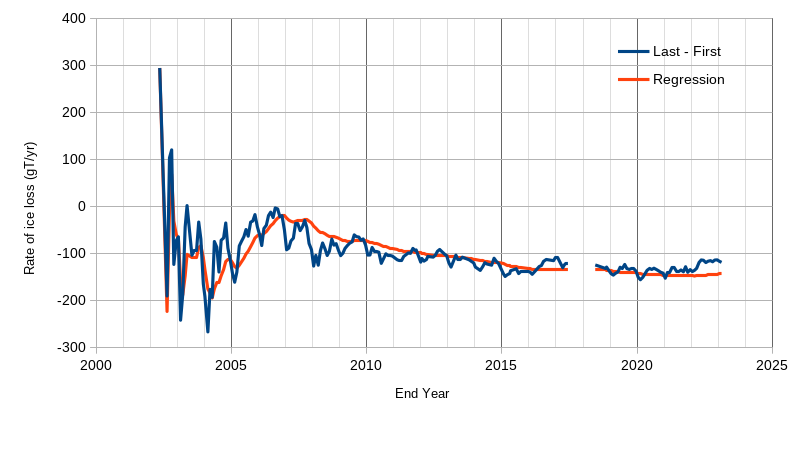
As expected, in the early times the noisy signal gives us a lot of variation in the "average" loss rate. Over time, the two values stabilize, but the "last minus first" approach is always more influenced by noise. The regression results become quite stable, and the last 2-3 years of higher mass have little effect on the regression slope. The "last minus first" approach creates a noticeable rise not seen in the regression slope (which uses all the data).
We can see this better if we zoom in on the last three years:
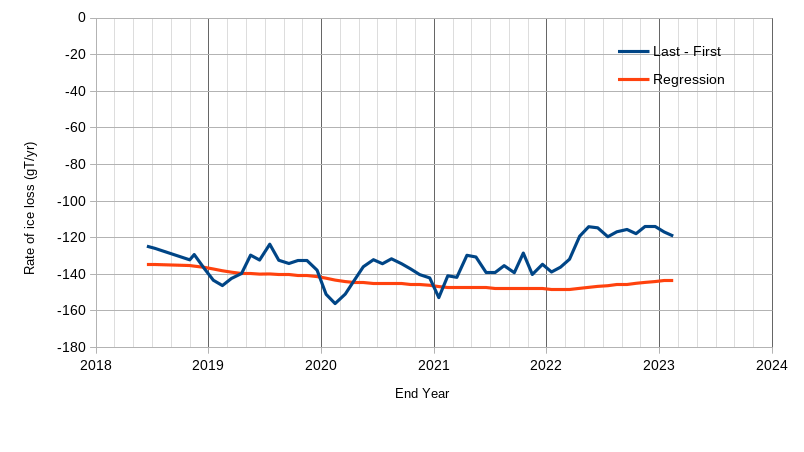
With calculations done each month, we can see somewhat of an annual cycle in the "last minus first" calculation, but this largely vanishes in the regression analysis. Bart's "interesting" rise in 2022-2023 results does not look much different from previous noise in the signal.
-
Bart Vreeken at 01:41 AM on 23 May 2023Antarctica is gaining ice
"Are you suggesting the most recent changes in ice mass are indicative of a substantive change in the trend? And if so, what do you think is driving such a change?"
That might be, yes. The driving force could be the low amount of sea ice, and the rising temperatures. Both of them can produce more snowfall. The question is: how will the discharge of the ice along the edge of the ice sheet react? And how is the balance between these two? Of course, things can be less positive when the climate change goes on. More precipitation can fall in the form of rain than, and the discharge can overrule the gain of ice again. Nowbody knows, that's why it's so interesting to have a close look on what happens.
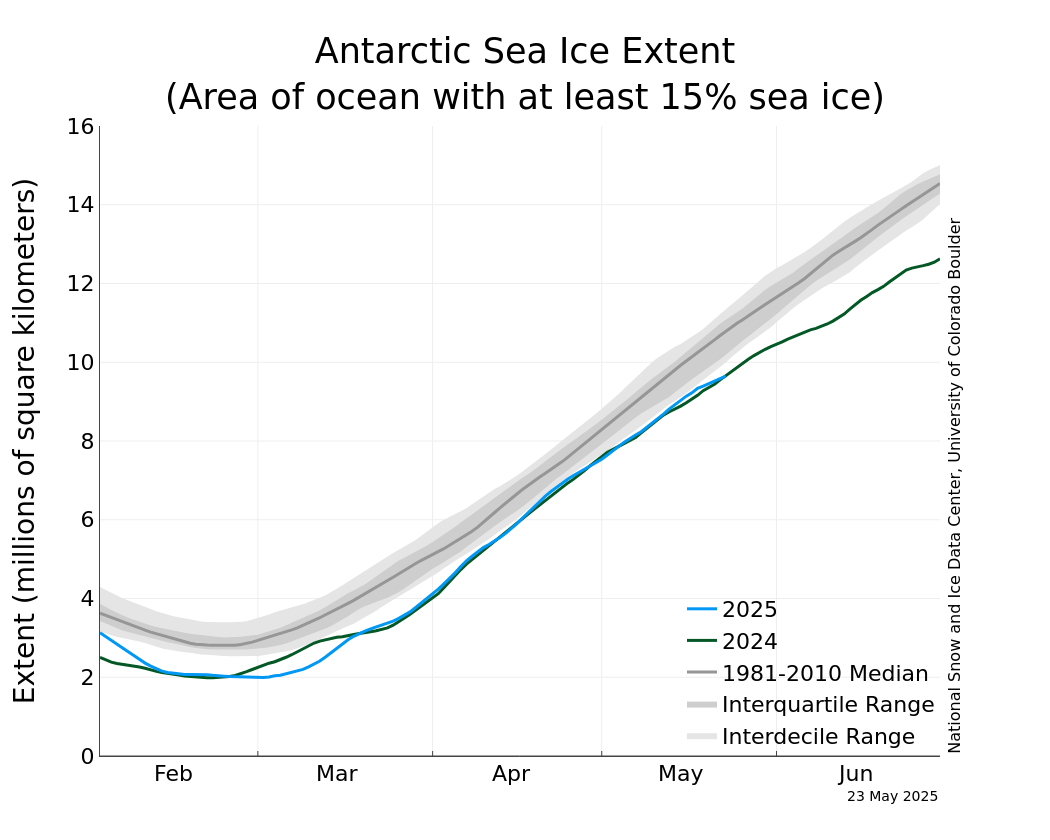 Moderator Response:
Moderator Response:[BL] Speculation snipped - "might be" and "nobody knows" is a concrete indication that you are engaging in pure speculation again. Again, you are contributing nothing that has not been said before. It was not "interesting" in March, and it is not "interesting" now.
-
Rob Honeycutt at 01:16 AM on 23 May 2023Antarctica is gaining ice
@571... "The amount of ice above the previous trend will first have to melt away again."
Come again? Would like to explain that?
Moderator Response:[BL] Bart appears to think that the processes that have decreased Antarctic ice mass by 2500 Gt in the last 20 years will have some sort of difficulty in removing 330 Gt that have accumulated in the past three years.
-
Rob Honeycutt at 01:11 AM on 23 May 2023Antarctica is gaining ice
You seem beligerently intent upon missing the forest for the trees, Bart.
Let's put it this way: Are you suggesting the most recent changes in ice mass are indicative of a substantive change in the trend? And if so, what do you think is driving such a change?
-
Bart Vreeken at 00:23 AM on 23 May 2023Antarctica is gaining ice
'Accusing NASA of cherry-picking, when they used what was probably all the available data at the time the analysis was done - and then claim that your analysis also ending in February is not cherry-picking because it is "all the available data", is hubris.'
Please have a better look.
- The data of the analysis by NASA run up to August 2020, but the last part is not used
- The data of my analysis starts and ends in February, so there is no seasonal effect.
Moderator Response:[BL] and it was explained back in March that the 149 gT/yr came from picking the maximum and the minimum. You can question that methodology, but accusing people of "cherry-picking" is an accusation of dishonesty.
Do you understand?
-
Bart Vreeken at 18:44 PM on 22 May 2023Antarctica is gaining ice
There is something wrong with the link above. It should be:
climate.nasa.gov/climate_resources/265/video-antarctic-ice-mass-loss-2002-2020/
-
Bart Vreeken at 18:39 PM on 22 May 2023Antarctica is gaining ice
"Where the 149 Gt/yr number comes from was discussed in March"
OK, let's have a look at the discussion in March. The 149 Gt/yr number comes from a video by NASA, published April 1, 2021.
https://climate.nasa.gov/climate_resources/265/video-antarctic-ice-mass-loss-2002-2020/
The selected data runs from October 2002 (+65 Gt) to February 2020 (-2808 Gt). That's already cherry-picking, for the ice mass tends to be low in February. Why do so? Maybe the publication date gives a hint ;-).
But ignoring the last two years, like Bob Loblaw does, is even more cherry-picking. This is how it looks like:

Is it also cherry-picking to end in February 2023? Not really, for it includes all the available data. Maybe we have a relatively high amount of ice now, according to the trend. But we won't know until afterwards. And remember that these are cumulative data. The amount of ice above the previous trend will first have to melt away again. That makes this figure different from a figure in which the temperature is displayed.
Moderator Response:[BL] Accusing commenters here of cherry-picking, when all they are doing it trying to explain how the NASA numbers were determined by NASA, is a violation of the comments policy. The numbers that went into the 149 gT/yr value were clearly stated last March in comment #540.
No accusations of deception. Any accusations of deception, fraud, dishonesty or corruption will be deleted. This applies to both sides. You may critique a person's methods but not their motives.
Accusing NASA of cherry-picking, when they used what was probably all the available data at the time the analysis was done - and then claim that your analysis also ending in February is not cherry-picking because it is "all the available data", is hubris.
Your argument about how the last few years changes the trend results was addressed in comment # 543, last March.
Once again, you are attempting to attribute great significance to short-term noise.
You are adding nothing new to the discussion. Repeating arguments without addressing the counter-arguments falls under the sloganeering category in the Comments Policy.
No sloganeering. Comments consisting of simple assertion of a myth already debunked by one of the main articles, and which contain no relevant counter argument or evidence from the peer reviewed literature constitutes trolling rather than genuine discussion. As such they will be deleted. If you think our debunking of one of those myths is in error, you are welcome to discuss that on the relevant thread, provided you give substantial reasons for believing the debunking is in error. It is asked that you do not clutter up threads by responding to comments that consist just of slogans.
If you continue to simply re-assert opinions with no substantive argument, expect to see your comments deleted.
[BL - added] Attributing the 149gT/yr number to a commenter (me) that simply demonstrated the source of the number is scientific malpractice. Such dishonesty will not be tolerated here.
-
Rob Honeycutt at 09:57 AM on 21 May 2023Antarctica is gaining ice
Bart @568... Wrong answer. Clearly all the red notations are your modifications, thus an unwary viewer might assume those notations are coming directly from NASA when they are not.
-
Bart Vreeken at 05:44 AM on 21 May 2023Antarctica is gaining ice
"Where the 149 Gt/yr number comes from was discussed in March"
OK, let's have a look at the data of IMBIE, then. IMBIE is the Ice Sheet Mass Balance Inter-comparison Exercise. They compare data from different sources: gravimetry, altimetry, input-output.
essd.copernicus.org/articles/15/1597/2023/
There, the average number over April 2002 - December 2020 is 114,9 Gt/Yr. Very much like my calculation, but without the data of 2021 and 2022.
Moderator Response:[BL] Once again, you are following the same path you followed in March. Instead of explaining what the source of your figures and numbers and results are the first time you post them, you are forcing people to ask questions, guess at the meaning of your material, speculate on how values are derived, etc. Only then do you provide relevant details.
For the final time, read the Comments Policy. In this case, the section that applies is:
No link or picture only. Any link or picture should be accompanied by text summarizing both the content of the link or picture, and showing how it is relevant to the topic of discussion. Failure to do both of these things will result in the comment being considered off topic.
If you post any further images without a clear indication of what modifications you have made and the source of any data you present, or comments that lack clarity, they will be considered off topic and deleted.
And again, like you did in March, you are jumping from GRACE to mass balance, to whatever pops up in your head next., Take the time to prepare one comprehensive and coherent comment, instead of a bunch of small scattered ones.
-
Bart Vreeken at 04:18 AM on 21 May 2023Antarctica is gaining ice
Hi Rob Honeycutt @567, there is no modification at all on the original graph from NASA itself. You can find the source below:
climate.nasa.gov/vital-signs/ice-sheets/
I only added the exact month of some of the extremes. And as you can see, I made my own calculation of the 'rate of change', with a very different result. Its calculated over 20 full years since February 2003, to avoid seasonal effects. (2280 Gt / 20 = 114 Gt/y). Where the 149 Gt/y published by NASA comes from, I really don't know. In the previous version it was 151 Gt/y.
Moderator Response:[BL] "There is no modification" and "I have only added" are mutually contradictory claims. This does your credibility no good.
Where the 149 Gt/yr number comes from was discussed in March. Please read over the older discussion before posting again.
-
Rob Honeycutt at 03:30 AM on 21 May 2023Antarctica is gaining ice
Bart @566... When posting a graph like this it would be wise and honest to make a clear notation clarifying it is a modification of the original graph from NASA, citing yourself as the source of the modifications. Otherwise you're misleading people to believe the modifications come directly from NASA.
Moderator Response:[BL] Indeed.
In particular, Bart's graph in comment # 566 has crossed out the value 149 Gt/yr and replaced it with 114 Gt/yr. The 149 is from NASA, and the 114 is from Bart. The difference between those two values was discussed in March, when Bart first introduced the 114 number in his first comment on this thread (#533). The 149 Gt/yr value is explained in the comments that follow.. I had linked to a site with GRACE data in comment 534, and explained the 149 Gt/yr number in comment #540.
If Bart is hoping that the previous discussions on this matter will be forgotten, he is wrong. If he is hoping to be able to post the same claims he made in March, without reflecting on the counter-arguments that were made then, he is wrong. He should in particular read the section of the Comments Policy on excessive repetition:
Comments should avoid excessive repetition. Discussions which circle back on themselves and involve endless repetition of points already discussed do not help clarify relevant points. They are merely tiresome to participants and a barrier to readers. If moderators believe you are being excessively repetitive, they will advise you as such, and any further repetition will be treated as being off topic.
-
Bart Vreeken at 18:50 PM on 20 May 2023Antarctica is gaining ice
After three months, there is another update of the gravitational measurements of the Antarctic ice sheet. The series now runs until February 13, which includes most of the Antarctic summer. Often in February there is a minimum in the amount of ice, but the pattern is not very tight.
We still see that Antarctica as a whole has a better period. Over the last three years, there has been no net decrease in land ice. The small amount of sea ice must play an important role in this. As a result, more snow falls. Apparently, that was enough to compensate for the increased melting and calving along the edge.
Changes to the floating ice shelves cannot be measured in this way.Moderator Response:[BL] Back to this again, with three months more noise to add to the end of the longer-term trend?
Once again, you are rambling and failing to make a clear explanation of what you expect people to see. The latter part of your comment (marked as "warning") is an assertion of highly speculative, unsupported statements made before.
If your intention is to return to previous posting patterns, expect to see strong moderation of your comments.
Please note that posting comments here at SkS is a privilege, not a right. This privilege can be rescinded if the posting individual treats adherence to the Comments Policy as optional, rather than the mandatory condition of participating in this online forum.
Please take the time to review the policy and ensure future comments are in full compliance with it. Thanks for your understanding and compliance in this matter.
-
nigelj at 06:56 AM on 19 May 2023‘It’s gotten really ugly.’ A community of freedom-lovers squares off against climate change in the Arizona desert
Reminds me of this commentary "How a New Hampshire libertarian utopia was foiled by bears:"
It really happened, its amusing, and says something about the unintended consequences of 'libertarianism.'
-
Ron at 03:18 AM on 19 May 2023CO2 lags temperature
Thanks Bob. I was just looking for something clearer. Don't really like the presentation on the intermediate and advanced tabs (forgot about those tabs, btw). Something with the lines closer together and the association clearer. With the lines colored and over each other. Thanks for your and other's efforts.
I did see one that made me gasp that blamed it somehow on jupiter and dust. Huh?
-
Bob Loblaw at 01:46 AM on 19 May 2023CO2 lags temperature
Thanks, MAR. I see that the story at The Conversation mentions one of the references linked in the Intermediate tab of this post (Parrenin et al, 2013).
-
Daniel Bailey at 01:46 AM on 19 May 2023CO2 lags temperature
For a longer view of the correlation between CO2 concentrations and global temperatures, look no further than this reconstruction of the past 540 million years of such from Scotese (Scotese 2021 - Phanerozoic paleotemperatures: The earth’s changing climate during the last 540 million years):
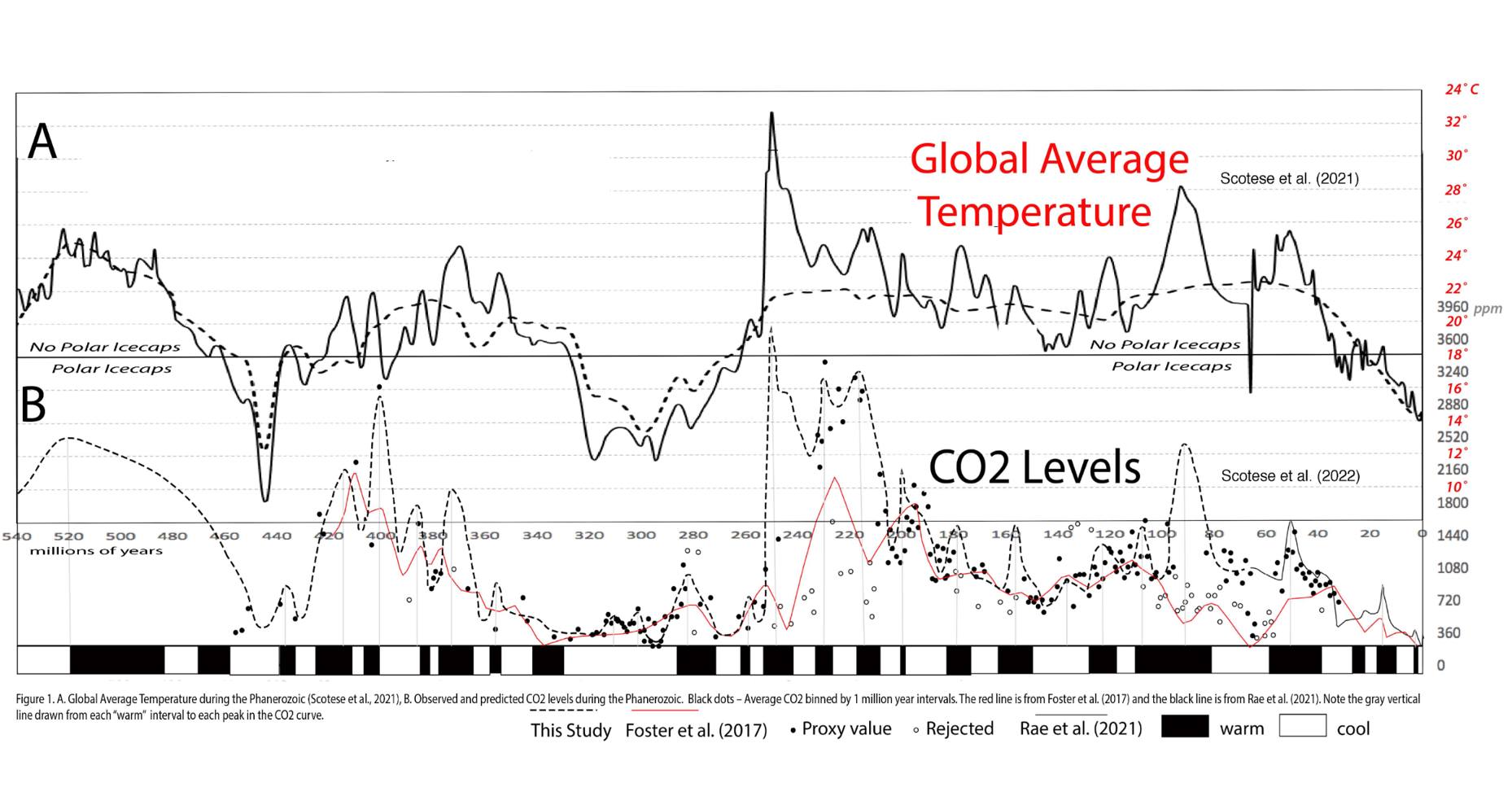
Link to paper
And leaving the last word on the subject to Scotese, a true expert in the field:
"It has been long recognized that the Earth’s climate, in particular the average global temperature, has alternated between ”icehouse” and “hothouse” states. More than 70 years ago, studies recognized that these climatic “modes” varied on short-term, medium-term, and long-term timescales. During the past 20 years, due to much outstanding research, we now stand at the threshold to a deeper, more complete understanding of both the tempo and mode of global temperature change during the Phanerozoic.
The Earth’s long-term temperature change is controlled by multiple tectonic and environmental processes that drive the Earth’s climate from icehouse to hothouse conditions, and vice versa. Many of these factors are interconnected by a complex network of positive and negative feedback loops that can accelerate or decelerate changes in long-term global temperature.
We are currently about halfway through a typical glacial/interglacial cycle. If humans did not inhabit the Earth, about 20,000 years from now, global temperatures would have once again begun to fall and ice sheets would have expanded into the oceans surrounding Antarctica and would have descended from the Arctic to begin a slow and steady march across the northern continents. However, this will not happen. The Earth has entered a “super-interglacial”. The injection of CO2 into the atmosphere as a consequence of the burning of fossil fuels has warmed the Earth more than 1°C and will continue to warm the Earth for another 300 years (~2300 CE).
In conclusion, we are leaving our Ice Age heritage behind. A new, warmer world awaits us. The problem we face is not so much where we are headed, but rather how we will get there."
-
MA Rodger at 01:20 AM on 19 May 2023CO2 lags temperature
Bob Loblaw @649,
The third of the graphics linked-to by Ron @647 (below) is sourced here and does have referenced sources.































 Arguments
Arguments



























